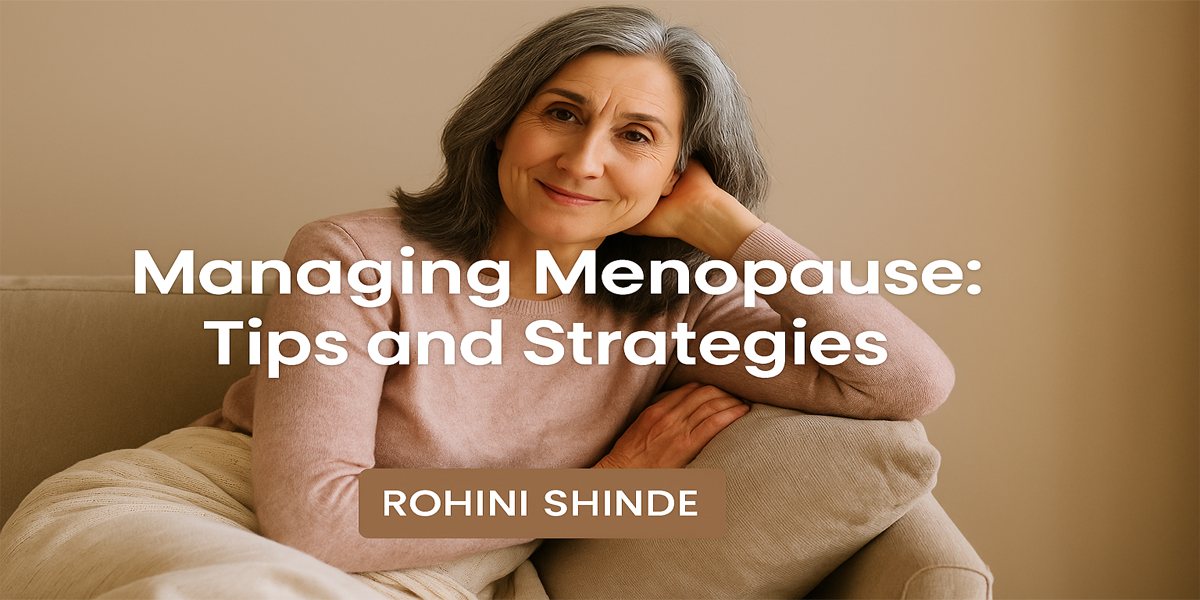Managing Menopause: Practical Tips and Proven Strategies for a Healthier Transition
Menopause Is a Natural Phase—Let’s Navigate It with Confidence, Not Confusion
Menopause marks a significant transition in a woman’s life, both biologically and emotionally. It typically occurs between ages 45–55, but the physical and emotional shifts can start earlier (perimenopause) and extend beyond the final menstrual cycle. While it’s a natural stage, menopause can bring a range of symptoms that affect your quality of life, health, relationships, and career.
But here’s the good news: with the right lifestyle strategies, support, and mindset, you can manage menopause smoothly—and even thrive during and after it.
In this guide, we explore expert-backed tips and holistic approaches to help you take control of menopause with strength and self-care.
Understanding Menopause: What’s Happening?
Menopause officially begins when you haven’t had a menstrual period for 12 consecutive months. It’s driven by a decline in estrogen and progesterone, leading to symptoms such as:
-
Irregular or missed periods
-
Hot flashes and night sweats
-
Mood swings or irritability
-
Vaginal dryness and low libido
-
Fatigue or insomnia
-
Brain fog or forgetfulness
-
Weight gain, especially around the abdomen
12 Tips and Strategies to Manage Menopause Effectively
1. 🧘♀️ Prioritise Stress Reduction
Stress amplifies menopausal symptoms—especially hot flashes, anxiety, and mood swings. Daily stress management can dramatically improve your hormonal balance.
Try:
-
Deep breathing exercises (4-7-8 technique)
-
Meditation or mindfulness apps (like Calm or Headspace)
-
Gentle yoga or tai chi
-
Journaling and gratitude practice
2. 🥦 Follow a Hormone-Balancing Diet
Your body’s nutritional needs change during menopause. Focus on foods that stabilize blood sugar, reduce inflammation, and support bone health.
Add more:
-
Leafy greens, berries, and cruciferous vegetables
-
Omega-3s from flaxseed, walnuts, or fatty fish
-
Calcium-rich foods (to prevent bone loss)
-
Whole grains, lentils, and lean proteins
Avoid:
Refined sugars, processed foods, excessive caffeine, and alcohol.
3. 🏋️♀️ Exercise Regularly
Staying active reduces weight gain, boosts mood, strengthens bones, and improves sleep—all essential during menopause.
Recommended routine:
-
150 minutes of moderate cardio (walking, swimming, dancing) per week
-
2–3 strength training sessions to protect muscle mass and bones
-
Flexibility and balance exercises (like yoga)
4. 🌙 Improve Sleep Hygiene
Insomnia is common due to hormonal shifts. Prioritize sleep to reduce fatigue, improve mood, and regulate metabolism.
Tips:
-
Stick to a regular sleep-wake schedule
-
Avoid blue light (screens) before bed
-
Use cooling sheets or a fan for night sweats
-
Limit caffeine after noon
5. 💧 Stay Hydrated
Estrogen affects fluid regulation. Drink 8–10 glasses of water daily to combat dryness, bloating, and fatigue.
Bonus: Hydration helps with weight management and clearer skin.
6. 🧠 Support Emotional Well-being
Mood swings, anxiety, or even depression can arise or intensify. Normalize emotional changes—and seek help when needed.
What helps:
-
Talking to a counselor or therapist
-
Connecting with other women going through the same phase
-
Cognitive Behavioral Therapy (CBT) for menopausal anxiety or insomnia
7. 🧴 Manage Vaginal Dryness & Sexual Health
Decreased estrogen can lead to dryness, discomfort during intercourse, or UTIs. But solutions are available.
Solutions:
-
Water-based lubricants or vaginal moisturizers
-
Regular intimacy (supports vaginal elasticity)
-
Consult your gynaecologist about low-dose estrogen therapy if needed
8. 🦴 Protect Your Bones
Bone density declines with age and estrogen loss, raising the risk of osteoporosis.
Prevention tips:
-
Ensure adequate calcium (1000–1200 mg/day) and vitamin D
-
Strength training
-
Bone scans (DEXA) if you’re postmenopausal
9. 💊 Consider Hormone Replacement Therapy (HRT)—Cautiously
HRT can be effective for severe symptoms. However, it’s not right for everyone.
Pros:
-
Reduces hot flashes, night sweats, vaginal dryness
-
May protect bones and heart (if started early)
Cons:
-
Slightly increased risk of breast cancer, blood clots, and stroke in some women
Consult a qualified doctor before starting any hormonal treatment.
10. 🌿 Explore Natural Remedies—With Care
Some herbal supplements show promise, but they aren’t magic bullets.
Popular options:
-
Black cohosh (for hot flashes)
-
Red clover (mild estrogenic effects)
-
Ashwagandha (stress and fatigue support)
-
Evening primrose oil (for breast tenderness and skin health)
Caution: Always check with your doctor—especially if you’re on medications.
11. 🧪 Schedule Regular Health Screenings
Menopause increases the risk of heart disease, osteoporosis, and metabolic changes. Keep a close watch with:
-
Annual mammograms and Pap smears
-
Thyroid checkups
-
Bone density scans
-
Blood pressure and cholesterol screening
-
Diabetes testing
12. 🤝 Don’t Navigate It Alone
Whether you’re feeling lost or empowered, community makes it easier. Join support groups, online forums, or workshops. Share stories, learn from others, and know—you’re not alone.
Menopause and Weight Gain: Why It Happens & How to Handle It
Slowed metabolism + hormonal shifts = stubborn belly fat. But you can manage it by:
-
Eating smaller, more frequent meals
-
Prioritizing protein
-
Managing stress (cortisol can lead to belly fat)
-
Increasing strength training
FAQs – Managing Menopause
❓What age does menopause typically start?
The average age is 51, but symptoms can start as early as 40 (perimenopause) and last several years.
❓Is menopause the same for every woman?
No. Some have mild symptoms, while others experience significant physical and emotional changes.
❓Should I take supplements during menopause?
Possibly. Common ones include calcium, vitamin D, magnesium, omega-3s, and iron (if deficient). Always consult your doctor first.
❓Can menopause affect mental health?
Yes. Hormonal changes can lead to mood swings, anxiety, and even depression. Professional support is recommended.
Final Words
Menopause is a natural and powerful transition—not a decline. With awareness, support, and the right strategies, you can emerge stronger, more self-aware, and healthier than ever.
At Rohini Shinde Content Studio, we specialize in writing human-first, wellness-focused content for healthcare brands, women’s health platforms, and lifestyle educators.
👉 Looking for professionally written, SEO-rich content on women’s wellness and hormonal health?
Explore Our Health & Wellness Content Services

